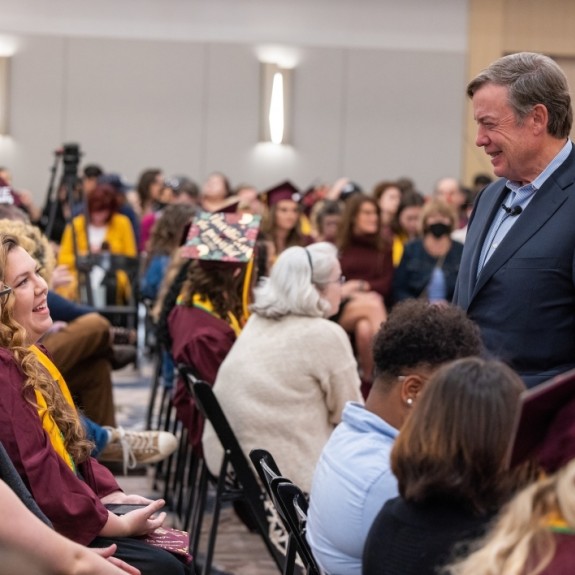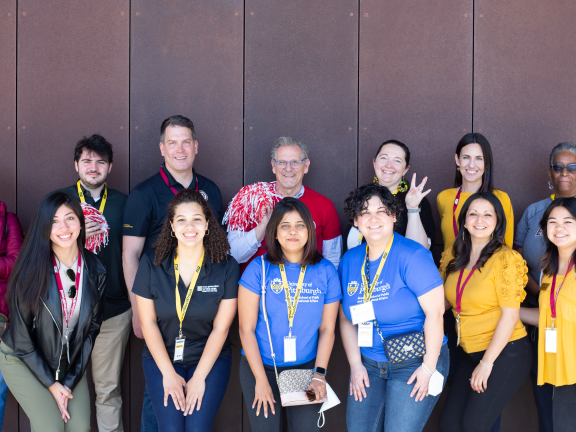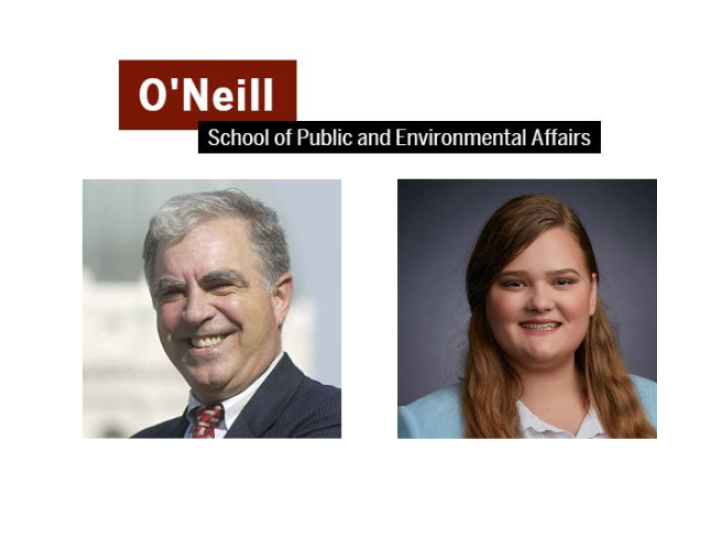Origin Story of Next Generation Service Corps

The Next Generation Service Corps inspires and prepares college students to serve their communities and nation.
SALLY WALLACE WAS GOBSMACKED.
Wallace, then dean of the Andrew Young School of Policy Studies at Georgia State University, was conducting focus groups to find out how to get undergraduate students more invested in public service, a perennial issue for schools of public service like hers. But the answers were worse than she expected. Many students did not even recognize the term.
"Students would just look at me and say, 'What do you mean by public service?' ... After 30 years of working in this field, I couldn't believe it. But the term just didn't resonate with them."
It felt like a dead end to Wallace, and at a very bad time. America is facing a greater crisis in democracy and civic life than it has in generations, with falling trust in government, growing political disinformation, and the January 6 insurrection serving as frightening indicators. Wallace was one of many education leaders trying to grapple with how America’s colleges and universities can help reverse the trend.
“Universities need to embrace public service and democracy building as part of their mission,” said Jonathan Koppell, President of Montclair State University in New Jersey. “Universities have to own this, especially public universities.”
“A public university [has to ask itself], ‘What are you doing to produce the widest range of leaders from the broadest cross-section of the population possible?'" Arizona State University President Michael Crow said. “No other institution really has the capability to do that except a public university.”
Wallace and the others each felt that there must be a solution. They believed that their students had deep passion for their community and represented an untapped resource for American democracy. So Wallace tried something different.
"It turns out that students are very interested in public service, it's just that their interest is expressed through social justice."
“We started asking open-ended questions in our focus groups and what came back to us was that the students were interested in public service, but it was expressed through social justice,” Wallace said. “They were looking for opportunities to give back that would increase equity, reduce racial disparities in public health, and things of that nature. Once that was established, then we really got moving.”
In other words, young people actually were interested in public service—but their vision for it didn’t fit the existing academic mold. A new kind of program was needed, something that encouraged undergraduate students to integrate public service with their social justice values and their existing career plans.
Which is why Wallace was excited to learn of a program Koppell and Crow had started at ASU. It was a Next Generation Service Corps geared specifically at engaging undergraduate students across multiple disciplines, and it was now being piloted nationally as the Next Generation Service Corps, with support from The Volcker Alliance.

George Washington himself...proposed the creation of a national university that would...champion the ideals of democracy and citizenship.
It was a new effort on an idea almost as old as the country. George Washington himself, in his first address to Congress, proposed the creation of a national university that would help to build up the young republic and champion its ideals of democracy and citizenship. Education was necessary to ensure that young people had the skills they needed to run government well, Washington said, and a moral understanding of the role of public service in a free society. Washington’s successor, Thomas Jefferson, investigated for years what kind of educational system the new country needed. His answer was to establish the United States Military Academy at West Point, so that at least the Army had a pool of skilled young graduates prepared and willing to dedicate years of service.
Unfortunately, the idea faltered after that. No equivalent service academy for the civilian workforce was ever founded. Despite revivals of the idea over the following centuries, no national public service education program was ever established. But the idea got a critical boost this century from legendary journalist Tom Brokaw. The former NBC Nightly News anchor had developed a deep respect for American soldiers, particularly those who served in World War II. He coined the term “Greatest Generation” to describe them, and spoke often about his belief that much of the post-war world he’d grown up with was a result of this generation’s contributions.
But the idea got a critical boost this century from legendary journalist Tom Brokaw. The former NBC Nightly News anchor had developed a deep respect for American soldiers, particularly those who served in World War II. He coined the term “Greatest Generation” to describe them, and spoke often about his belief that much of the post-war world he’d grown up with was a result of this generation’s contributions.
“I grew up in a working class family out in the middle of the country and everybody felt an obligation to improve the country,” Brokaw said in an interview with the Volcker Alliance.
“I grew up in a working class family out in the middle of the country and everybody felt an obligation to improve the country,” Brokaw said in an interview with the Volcker Alliance. “These were all World War II veterans that I grew up around, and they came out of the war just on fire about doing something for the country. But also it’s fair to say that they came out of the war with a whole new tool set. They learned how to get things done.”
After touring warzones in Iraq and Afghanistan, Brokaw came to believe that today’s soldiers and civilians faced even more complex problems than previous generations, but lacked the skills they needed. In his 2011 book The Time of our Lives, and in speeches and interviews around the country, Brokaw revived the idea of a Next Generation Service Corps.
“We could have public service academies …. Then we’ve got a new workforce with a new skill set that we’ll need to go into the future,” Brokaw said during an appearance on The Daily Show. “And we need some big bold ideas in this country that everyone can get excited about.”
“We could have public service academies …. Then we’ve got a new workforce with a new skill set that we’ll need to go into the future,” Brokaw said during an appearance on The Daily Show. “And we need some big bold ideas in this country that everyone can get excited about.”
Crow was in the audience during one of Brokaw’s speeches and sensed an opportunity. He had already built ASU into one of the largest and most diverse schools in the country, but he wanted the school to do more to help tackle the nation’s big problems and to inspire public service. He already had a team researching different proposals for national service programs when he crossed paths with Brokaw.
“We were doing all of this thinking about this and then Tom Brokaw gave this speech,” Crow said. “So I went to New York and I sat in his office. And I just said simply: ‘Okay. We’ll do that.’”
With Brokaw’s support, Crow tasked Koppell, then serving as dean of ASU’s Watts College of Public Service and Community Solutions, to launch the program. Koppell had the same thoughts as Wallace about the untapped potential of his students.

“I think younger people today are quite service motivated,” Jonathan Koppell said. “They want to do something that matters in the world, but they don’t have any way to be prepared.”
Early on, the team began focusing on one of the more successful models in existence for service training: the U.S. military’s Reserve Officer Training Corp, or ROTC. ROTC offers students help with tuition in exchange for several years of service as officers in the military and trains the majority of the military’s active officers, far more than West Point. Like ROTC, ASU’s Next Generation Service Corpswould not be an academic major in-and-of-itself, Koppell’s team decided. Students studying finance or English or engineering would all be welcome.
“Choosing public service doesn’t have to mean you give up your desire to be a doctor or a business person or an artist, it’s compatible with those things,” Koppell said. “This is about who you are, not what your job is.”
But at the same time, Koppell said, “there should be an academic credential that has some meat to it,” so that participating students would have something tangible that they could show to employers as evidence of their training. They decided the academy would function as a certificate program, similar to programs in nonprofit management or health education that offer proof of specialized training.
"We built three structures: coursework, internships, and leadership development... and soon it wasn’t me figuring out the volunteering opportunities, it was the students."
The first cohort of 100 students began at ASU’s Next Generation Service Corps in 2015. Koppell tapped Brett Hunt—a former U.S. Army Captain, State Department Foreign Service Officer, and ROTC alum who in many ways personified the program’s goals—as the first executive director. For the first year of the program, Hunt focused mostly on a key issue that Brokaw had elevated: cooperation between military and civilian leaders. Participants embedded with ROTC units during practice maneuvers, playing the roles of civilians or journalists. But as the program grew in the following years, Hunt focused more on empowering students to become leaders.
“We built three structures: coursework, internships, and leadership development experience,” Hunt said. “We started giving those students who were sophomores leadership roles, and they took over the major components of the program. So it was no longer me figuring out the volunteering opportunities, it was a student who was the service chair and who was responsible for coming up with a proposal for events.”
By 2019, the academy had roughly 600 students spread across all four undergraduate years. The ASU team had always hoped that it would grow to meet Brokaw’s vision of a national program, but moving beyond ASU was proving tricky. Universities, like all institutions, are territorial and competitive, Crow said. No university president would ever host a program that carried the name of a rival.

But Brokaw was not the only elder statesman concerned about public service. Paul A. Volcker had worked in the federal government for almost thirty years, most famously as chairman of the Board of Governors of the Federal Reserve System during the financially turbulent period from 1979 to 1987. Upon his retirement in 2013, he had founded the Volcker Alliance as a nonprofit that would champion the public service values his own career had embodied. As part of that mission, the Alliance had started bringing together deans of schools of public service, including Koppell and Wallace, for regular meetings to drive innovation and share best practices. At one 2019 meeting, Koppell presented to other deans what ASU had accomplished with its Next Generation Service Corps, and the idea immediately caught fire.
“Everyone was like, ‘Let’s do that! How do we get something like that happening on our campus?’” Volcker Alliance President Sara Mogulescu said. “It was clear that there was both momentum to try and adapt the ASU model for other schools and a gap in resources to make it happen. People wanted to do it but they couldn’t do it alone.”
A planned conference for the deans at ASU in April 2020 was canceled due to the COVID pandemic, but the organization pressed ahead and launched the Next Generation Service Corps program formally in June 2020 with an initial cohort of four school partners (Arizona State University, Georgia State University, City University of New York, and the University of Nebraska Omaha). The Alliance provided seed funding and access to programming developed first at ASU and then further refined. The Alliance could support interested schools in ways that ASU couldn’t, and its existing national credibility and public service mission made it a highly desirable partner. As momentum and demand built quickly, Hunt left ASU and became the program director for the national effort at the Alliance in September 2021.
Wallace’s GSU was part of that initial cohort. Her students, joining the program in the wake of the racial justice protests of 2020 and the attack on the U.S. Capitol, initially focused on ways to increase voter participation. The students were not very worried, as Brokaw had been, about the growth of democracy in Afghanistan, Wallace said. They were worried about its survival here at home.
“These students are driven by something that my own generation can’t fully understand,” Wallace said. “Many of them grew up in Atlanta with its deep history in the civil rights movement, and these values are baked into their childhood and upbringing.”
Looking forward, all of those people involved in Next Gen’s start and growth agreed that the program is needed now more than ever. The Alliance plans to expand the program to more universities across the country, and to continue adapting the model to serve a wide range of students while adhering to the program’s core goals of encouraging and empowering students to make public service part of their future.

"The young people coming out of college during these very difficult times have extraordinary skills...What we have here, in terms of opportunity, is really just pretty astonishing." Tom Brokaw
“We have to find a way to work together,” Brokaw said. “The young people who are coming out of college during these very difficult times have extraordinary skills. It is just hard for people in my generation to have a full appreciation of just how smart they are, and how dedicated they are. What we have here, in terms of opportunity, is really just pretty astonishing.”
“I didn’t know in 2012 where the state of American democracy would be in 2022,” Koppell said. “I think Next Generation Service Corps is particularly important now, as a mechanism to try and bolster democratic institutions."
“It is infinitely more urgent because we’ve got some slippage in democracy,” Crow said. “We do not have enough specially trained leaders in public service. The Next Generation Service Corps, by design, is intended to produce the leaders and the doers and the thinkers capable of figuring out how to get this modern democracy to actually work. And we need a lot more people to do that.”

